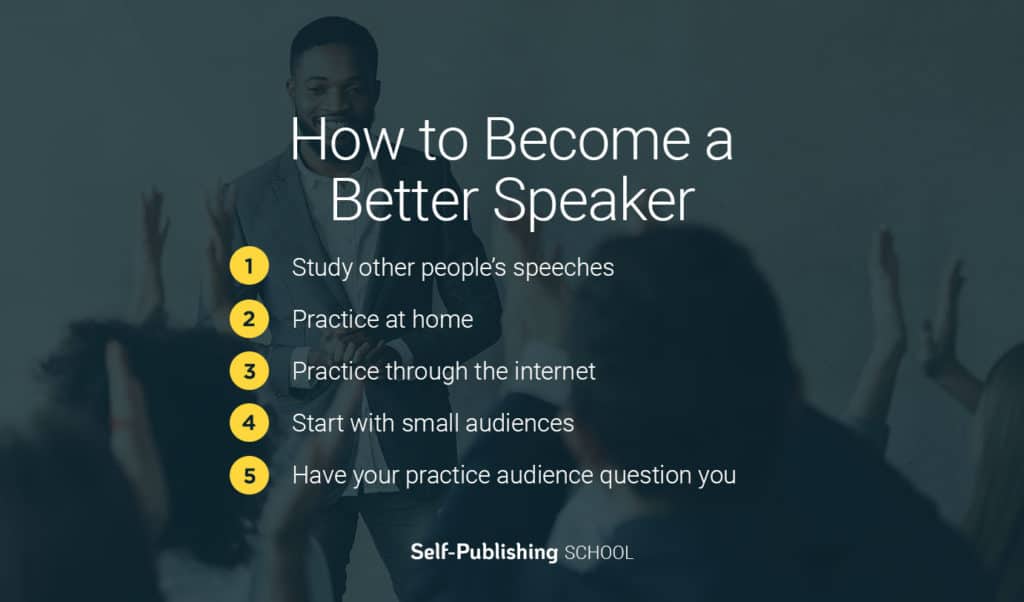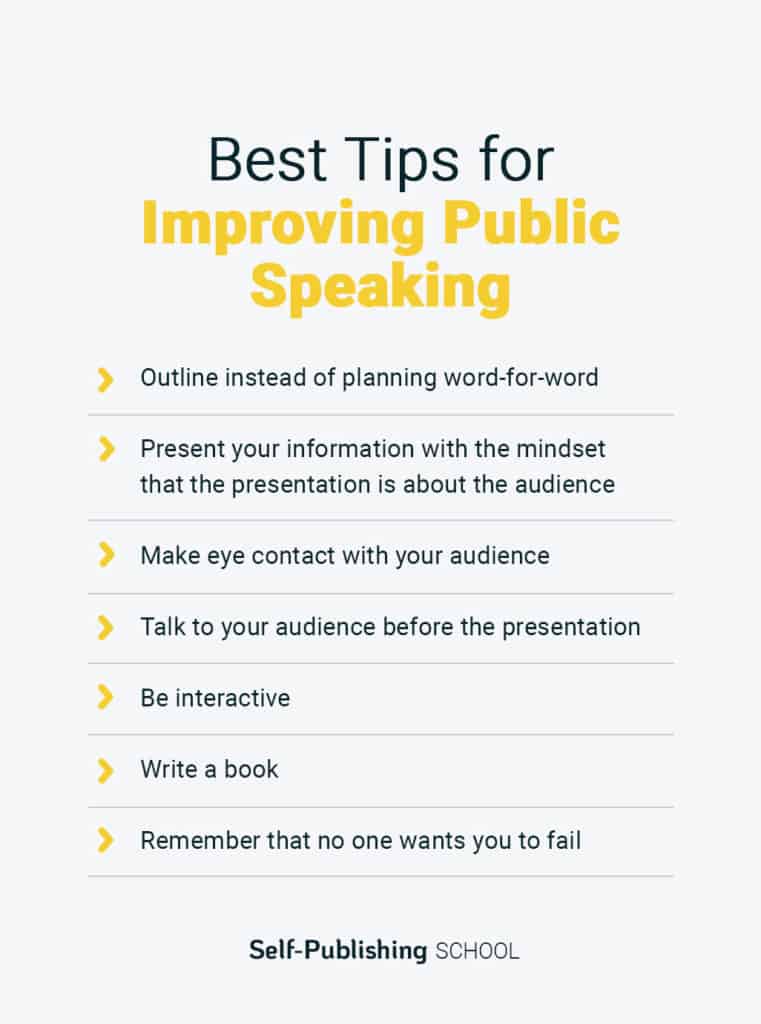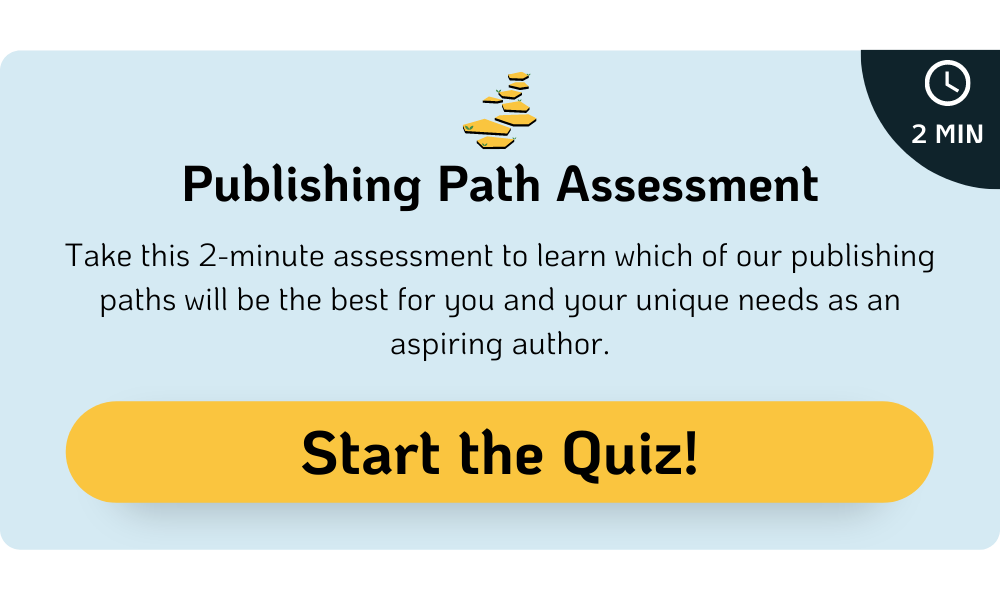Learning how to become a better speaker is different for everyone.
If you’ve ever attended school, been employed, or participated as a member of a club or committee, you have almost definitely been subjected to some form of public speaking.
Horrific, scarring, awful. We sweat, we cry, maybe we throw up.
Public speaking can be a terrible experience for the unprepared person, the anxious person, the just-spilled-coffee-down-the-front-of-my-white-dress person (maybe that one was just me?), but the benefits of public speaking FAR outweigh the negatives, AND (great news!) I’m here to help.
We’re going to learn how to be better at public speaking:
- Why it’s important to be a good speaker
- How speaking can grow your career
- How to become a better speaker
- Tips for being a strong speaker
Why It’s Important to Improve Speaking Skills
Like I said, participating in nearly anything presents the opportunity for public speaking. Can it be avoided most of the time? Probably. In fact–
When I was in college, seventeen-year-old Hannah’s presentation skills were weighed, measured, and found wanting. I spoke too fast, I used too many filler words (and filler sounds ????), and I made inside jokes as a nervous tick (shoutout to my friends who sat in the back and laughed way louder than they needed to).
Opportunity after opportunity to speak in public presented themselves. I gave research presentations, I addressed committees, I taught classes for honors credit–it came up a LOT. And I was an expert at crawfishing my way out of it.
For example, in my required Speech class, I put HOURS of work into writing, practicing, and perfecting speeches–only to strategically fall ill, have a dentist appointment, or slouch so low in my desk I was halfway on the floor to avoid actually giving the speech.
I was supposed to give SIX presentations for that class–I gave ONE, and I only gave that one because someone ratted me out.
Shockingly, refusing to practice didn’t make me any better at speaking.
Go figure. I eventually decided I needed to face my fears and just rip it like a bandaid until I improved. Sophomore year, I started hopping at opportunities to speak. If we had a group project, I’d present. If we were hosting a fundraiser for an organization I chaired, I’d give the thank you address. I went to live readings for creative writing and read my own pieces out loud (awful, terrible, kill me).
It was awkward and uncomfortable! I’d walk up to podiums bright red and breathing heavy on my shaky little legs. But the more I threw myself out of my comfort zone, the better I got, and the more natural it came to me.
By my senior year, I was presenting something almost every week. I breathed evenly, my legs didn’t shake anymore, and my face stayed its natural, iridescent pale for the whole presentation.
Being a good public speaker often directly translates to being a better private speaker as well.
Here’s what I learned from public speaking:
- I learned how to give cues better–I indicate with my hands to help people follow along with multiple or complex ideas
- I can better read a room’s environment
- I can code switch more precisely
- I can translate ideas to coherent verbal communication much easier
- I caught a lot of opportunities by putting myself out there. You never know who’s in an audience and what they’ll remember you for. I got job offers, scholarships, and friends just from using my voice and putting myself out there.
It is less often the things you say and more often how you say them that can influence people. A confident speaker instills confidence–people trust a well-presented thought more than that same thought when it’s expressed with stammering and uptalk.
If you believe what you’re saying, and you sound like you believe what you’re saying, other people will be inclined to believe it as well.
How Becoming a Better Speaker Can Grow Your Career
In almost any industry, being a strong speaker can help build your career. Taking on speaking roles can prove leadership capabilities, responsibility, confidence, and competence.
Volunteering to pitch a project to your boss, for example, can endear you to the coworkers who have been alleviated of the task, places you as the face of the project, and shows your boss that you have initiative. That’s something people remember.
If you’re self-employed, speaking at events can help promote your own work–like products, books, and courses. Public speaking events can be a great platform facet.
Pairing a book with a course with in-person seminars creates a full experience for your clients. And, just like in a traditional job, speaking well projects leadership, responsibility, confidence, and competence.

How to Become a Better Speaker
So we know why we want to be better speakers, but how do we get there?
Here are five easy ways you can practice public speaking without actually throwing yourself into the ring yet.
#1 – Study other people’s speeches
Watch talks from strong orators or presenters in your industry. See what you like about their presentation style, think about what you would do differently, and apply that insight to your own speeches. Take note of how they use the stage space, what they do with their hands, how they keep eye contact, and how they utilize pauses. All of these are practiced, intentional actions that experienced speakers master over time.
#2 – Practice at home
Rehearse your speeches in front of a mirror, or even record yourself presenting. Watch the video back to see how your body language is helping or hurting, if you keep good eye contact (or lens contact), and spot any filler language you might need to cut back on. This low-pressure rehearsal time will help you focus on honing specific skills.
Until I was sixteen, I barely spoke to people outside of my immediate family. I never expressed when I was uncomfortable, I never argued. Then I started my first YouTube channel. My old videos are awkward and cringey to watch now, but they literally taught me how to verbally express myself. I developed an online voice, and it translated over to how I spoke with others in person, which eventually led me to become a stronger public speaker.
#3 – Practice through the internet.
With COVID-19 lockdowns and social distancing, now’s as good a time as ever to practice speaking through online live events. Maybe start even smaller by gathering a few friends in a groupcall to discuss something specific. Then you can transition to something like a livestream, where it’s only you talking. Try to interact with viewers’ messages to get practice generating live responses and engaging with an audience.
#4 – Start with small audiences.
If you have housemates or in-person coworkers right now, practice speaking in front of them. Having a friendlier audience you’re close with is often a more comfortable stepping stone as you work your way up to bigger speaking engagements. You can even expand that audience a little at a time by adding one or two friends to the group each time.
#5 – Have your practice audience question you.
When I presented research in college, I’d present in front of friends first and have them grill me about the material. This helped me make sure I actually comprehended the material well enough to present it competently, and it also gave me practice answering questions the audience might really have. Having a more challenging practice round will help you feel more prepared and more confident when it’s time for the real thing.
Best Tips for Improving Public Speaking
Here are seven extra hacks and tips you can use to strengthen your public speaking skills.
- Outline instead of planning word-for-word. Oftentimes, it’s better to have a bulleted list of topics to cover rather than memorizing a speech script. With a script, forgetting a word or a line can throw off the entire rhythm and you might forget what you were saying. If you practice speaking with your main points, you can make it up as you go, speaking from a place of studied authority instead of spouting a memorized speech phonetically. Even if you don’t stumble over a line, a memorized speech can also sound mechanical and less engaging to listen to.
- Use audience-first language and present information with the mindset that the presentation is about THEM. It’s not a performance about you–you’re educating or sharing tools to help the people listening. Make sure you don’t turn a speech into one-sided speed dating. If you make the presentation about you, it’s less interesting to listen to and easier to get into your own head. It might make you feel more open to judgment if it’s about YOU, so keep in the headspace that it’s about your AUDIENCE and remember that you’re there to help them.
- Make eye contact with your audience. Picking a spot on the wall or ceiling or floor to watch during a speech probably feels more comfortable, but if you can make eye contact with a different audience member every few seconds, you’ll keep the crowd much more engaged and help keep yourself on track of the conversation. Remember that you’re talking to people by looking at the people you’re talking to.
- Talk to your audience before the presentation. If you can, mingle with audience members before your speech. If it’s an event, this is a great networking exercise, but it will also help to humanize the audience to you, and you to the audience. It’ll be more like a continued conversation by the time you’re ready to speak if you’ve already made a few introductions.
- Be interactive during your speech. Ask questions to the audience, react to their reactions, call out to specific people you know in the audience and share related anecdotes involving them. If you make it an interaction instead of a one-sided information dump, you’ll be more relaxed and the audience will be more engaged to receive your message.
- Gain confidence and authority on your subject matter through a book. Publishing a nonfiction book in your area of expertise will instantly increase your credibility with an audience, as well as help to relax your nerves because you know that you know your stuff. You literally wrote the book on it. Like I said earlier, layering multiple elements like a book, a course, and live seminars gives you a strong, authoritative position for your platform.
- Remember that no one wants you to fail. This tip was absolutely pivotal for me as I was building my foundation in public speaking. The audience wants you to do well. They don’t want to see someone crash and burn–they’re there to hear a compelling, interesting, entertaining speech. Everyone is supporting your success, so don’t feel intimidated!
And here’s an image to help memorize that:

These tips and exercises helped me ENORMOUSLY. If I can public speak with ease today after growing up crushingly shy and borderline nonverbal, so can you!
Don’t be afraid to volunteer to speak if the opportunity presents itself, let yourself be nervous, and know that practice will make it better.
If you need to, use the at-home tips to gain a little confidence before you try out an audience, but don’t be afraid to take chances and mess up a little! All speaking experiences, even the ones that don’t go so well, will help you grow as a presenter.
